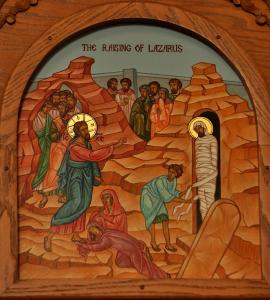Protestant anti-Catholic apologist Jason Engwer, who runs the Tribalblogue site, takes some potshots against the Assumption of Mary in his article, Luke Against Roman Catholic Mariology (10-24-21). I counter with similar arguments, using his incessantly skeptical, cynical methodology (two can play at this game). His words will be in blue.
*****
Similarly, she’s mentioned in Acts 1:14, but not in the three decades of church history narrated afterward. No assumption of Mary is mentioned either. . . . if she died within the history covered by the document, especially if she died earlier rather than later, why is there no mention of an assumption? . . .
Luke’s writings can be an important part of a cumulative argument when considering an issue like the assumption of Mary. The more sources we have that show interest in relevant subjects, yet don’t mention an assumption of Mary, the less likely it is that she was assumed (e.g., Luke’s failure to mention an assumption despite multiple references to Jesus’ ascension, . . .) . . . Luke is the sort of author who would have been in an unusually good position to have referred to an assumption if one had occurred. He wrote a lot in relevant contexts, including a substantial amount about Mary, he probably was writing after the time of Mary’s death, he was in contact with at least one relative of Jesus (Acts 21:18), . . .
Matthew’s Gospel can be an important part of a cumulative argument when considering an issue like the ascension of Jesus. The more sources we have that show interest in relevant subjects, yet don’t mention an ascension of Jesus, the less likely it is that He ascended to heaven (e.g., Matthew’s failure to mention His ascension . . .) . . . Matthew is the sort of author who would have been in an unusually good position to have referred to His ascension if it had occurred. He wrote a lot in relevant contexts, including a substantial amount about Jesus, . . .
John’s Gospel can be an important part of a cumulative argument when considering an issue like the ascension of Jesus. The more sources we have that show interest in relevant subjects, yet don’t mention an ascension of Jesus, the less likely it is that He ascended to heaven (e.g., John’s failure to mention His ascension . . .) . . . John is the sort of author who would have been in an unusually good position to have referred to His ascension if it had occurred. He wrote a lot in relevant contexts, including a substantial amount about Jesus, . . .
[Note: The book of Acts “is usually dated to around 80–90 AD, although some scholars suggest 90–110”: according to Wikipedia. St. Paul’s death, according to the Wikipedia article about him, “is believed to have occurred after the Great Fire of Rome in July 64, but before the last year of Nero’s reign, in 68.” St. Peter’s death, in the article devoted to him –according to “Early Church tradition” was “at the time of the Great Fire of Rome in the year 64.”]
No martyrdom of St. Paul is mentioned [in Acts] either. . . . if he died within the history covered by the document, especially if he died earlier rather than later, why is there no mention of his martyrdom? . . . Luke’s writings can be an important part of a cumulative argument when considering an issue like the martyrdom of St. Paul. The more sources we have that show interest in relevant subjects, yet don’t mention martyrdom of St. Paul, the less likely it is that he was martyred (e.g., Luke’s failure to mention martyrdom of St. Paul . . .) . . . Luke is the sort of author who would have been in an unusually good position to have referred to the martyrdom of St. Paul if it had occurred. He wrote a lot in relevant contexts, including a substantial amount about St. Paul, . . .
No martyrdom of St. Peter is mentioned [in Acts] either. . . . if he died within the history covered by the document, especially if he died earlier rather than later, why is there no mention of his martyrdom? . . . Luke’s writings can be an important part of a cumulative argument when considering an issue like the martyrdom of St. Peter. The more sources we have that show interest in relevant subjects, yet don’t mention martyrdom of St. Peter, the less likely it is that he was martyred (e.g., Luke’s failure to mention martyrdom of St. Peter . . .) . . . Luke is the sort of author who would have been in an unusually good position to have referred to the martyrdom of St. Peter if it had occurred. He wrote a lot in relevant contexts, including a substantial amount about St. Peter, . . .
Mark’s Gospel can be an important part of a cumulative argument when considering an issue like the virgin birth in Bethlehem of Jesus. The more sources we have that show interest in relevant subjects, yet don’t mention the virgin birth in Bethlehem of Jesus, the less likely it is that He was born of a virgin in Bethlehem (e.g., Mark’s failure to mention His virgin birth in Bethlehem, or Bethlehem at all in his entire Gospel . . .) . . . Mark is the sort of author who would have been in an unusually good position to have referred to the virgin birth in Bethlehem of Jesus if it had occurred. He wrote a lot in relevant contexts, including a substantial amount about Jesus, . . .
John’s Gospel can be an important part of a cumulative argument when considering an issue like the virgin birth in Bethlehem of Jesus. The more sources we have that show interest in relevant subjects, yet don’t mention the virgin birth in Bethlehem of Jesus, the less likely it is that He was born of a virgin in Bethlehem (e.g., John’s failure to mention His virgin birth in Bethlehem, . . .) . . . John is the sort of author who would have been in an unusually good position to have referred to the virgin birth in Bethlehem of Jesus if it had occurred. He wrote a lot in relevant contexts, including a substantial amount about Jesus, . . .
Matthew’s Gospel can be an important part of a cumulative argument when considering an issue like the raising of Lazarus from the dead by Jesus. The more sources we have that show interest in relevant subjects, yet don’t mention the raising of Lazarus, the less likely it is that Lazarus was raised by Jesus (e.g., Matthew’s failure to mention His being raised from the dead by Jesus . . .) . . . Matthew is the sort of author who would have been in an unusually good position to have referred to the raising of Lazarus from the dead by Jesus if it had occurred. He wrote a lot in relevant contexts, including a substantial amount about Jesus, . . .
Mark’s Gospel can be an important part of a cumulative argument when considering an issue like the raising of Lazarus from the dead by Jesus. The more sources we have that show interest in relevant subjects, yet don’t mention the raising of Lazarus, the less likely it is that Lazarus was raised by Jesus (e.g., Mark’s failure to mention His being raised from the dead by Jesus . . .) . . . Mark is the sort of author who would have been in an unusually good position to have referred to the raising of Lazarus from the dead by Jesus if it had occurred. He wrote a lot in relevant contexts, including a substantial amount about Jesus, . . .
Luke’s Gospel can be an important part of a cumulative argument when considering an issue like the raising of Lazarus from the dead by Jesus. The more sources we have that show interest in relevant subjects, yet don’t mention the raising of Lazarus, the less likely it is that Lazarus was raised by Jesus (e.g., Luke’s failure to mention His being raised from the dead by Jesus . . .) . . . Luke is the sort of author who would have been in an unusually good position to have referred to the raising of Lazarus from the dead by Jesus if it had occurred. He wrote a lot in relevant contexts, including a substantial amount about Jesus, . . .
Etc., etc. One gets the analogical / satirical point by now . . .
***














